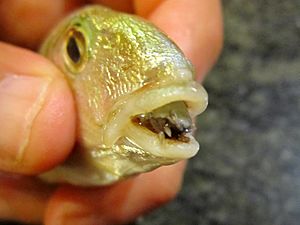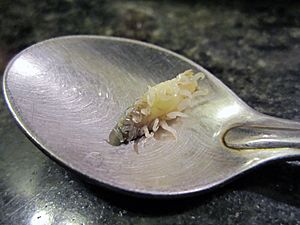Tongue-eating louse facts for kids
Quick facts for kids Cymothoa exigua |
|
|---|---|
 |
|
 |
|
| Scientific classification | |
| Kingdom: | |
| Phylum: | |
| Subphylum: | |
| Class: | |
| Order: | |
| Family: |
Cymothoidae
|
| Genus: |
Cymothoa
|
| Species: |
C. exigua
|
| Binomial name | |
| Cymothoa exigua (Schiødte & Meinert, 1884)
|
|
Cymothoa exigua, also known as the tongue-eating louse, is a type of crustacean. It is a parasitic isopod, which means it lives on or in another animal and gets its food from that animal. This tiny creature is famous for its very unusual way of living inside fish.
Contents
How the Tongue-Eating Louse Works
This amazing parasite starts its life by entering a fish through its gills. Once inside, it finds its special spot. The female louse attaches itself to the fish's tongue. At the same time, the male louse attaches to the gill arches, which are just behind and below the female.
Replacing the Tongue
The female parasite then begins to damage the fish's tongue. It does this by getting blood through its front claws. This causes the fish's tongue to atrophy, meaning it shrinks and withers away because it doesn't get enough blood.
After the fish's tongue is completely destroyed, the louse attaches itself to the small stump that is left. It then becomes the fish's new tongue! The fish can actually use the louse just like it would use a normal tongue.
What It Eats
Once C. exigua has replaced the tongue, it feeds in a couple of ways. Some of these parasites continue to feed on the host fish's blood. Others feed on the fish's mucus, which is a slimy protective layer.
A Unique Parasite
This is the only known case where a parasite completely replaces the function of an organ in its host. There are many different types of Cymothoa species, but only C. exigua is known to eat and replace its host's tongue. It seems that this parasite does not cause any other harm to the fish it lives with.
See also
 In Spanish: Cymothoa exigua para niños
In Spanish: Cymothoa exigua para niños
 | Chris Smalls |
 | Fred Hampton |
 | Ralph Abernathy |

